Chapter: 11th Computer Science : Chapter 1 : Introduction to Computers
Components of a Computer
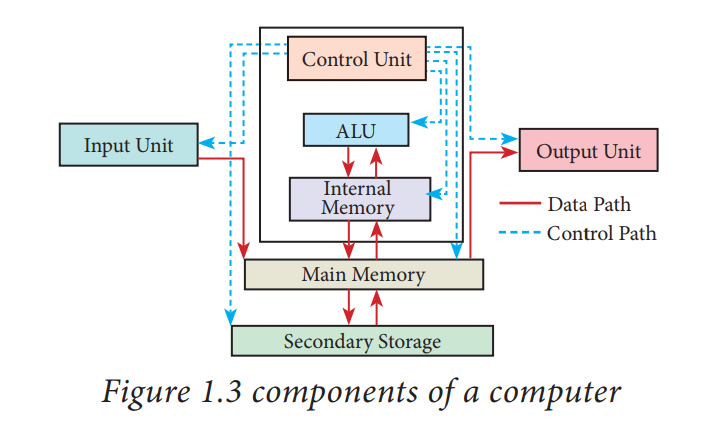
Components of a Computer
The computer is the combination of
hardware and software. Hardware is the physical component of a computer like
motherboard, memory devices, monitor, keyboard etc., while software is the set
of programs or instructions. Both hardware and software together make the
computer system to function.
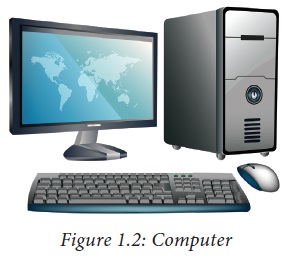
Let us first have a look at the
functional components of a computer. Every task given to a computer follows an
Input- Process- Output Cycle (IPO cycle). It needs certain input, processes
that input and produces the desired output. The input unit takes the input, the
central processing unit does the processing of data and the output unit
produces the output. The memory unit holds the data and instructions during the
processing.
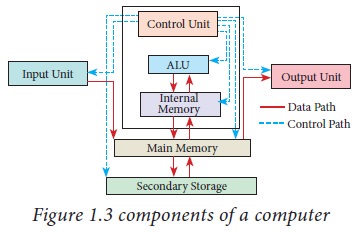
1. Input Unit
Input unit is used to feed any
form of data to the computer, which can be stored in the memory unit for
further processing. Example: Keyboard, mouse, etc.
2. Central Processing Unit
CPU is the major component which
interprets and executes software instructions. It also control the operation of
all other components such as memory, input and output units. It accepts binary
data as input, process the data according to the instructions and provide the
result as output.
The CPU has three components which
are Control unit, Arithmetic and logic unit (ALU) and Memory unit.
2.1 Arithmetic and Logic Unit
The ALU is a part of the CPU where
various computing functions are performed on data. The ALU performs arithmetic
operations such as addition, subtraction, multiplication, division and logical
operations. The result of an operation is stored in internal memory of CPU. The
logical operations of ALU promote the decision-making ability of a computer.
2.2 Control Unit
The control unit controls the flow
of data between the CPU, memory and I/O devices. It also controls the entire
operation of a computer.
3. Output Unit
An Output Unit is any hardware
component that conveys information to users in an understandable form. Example:
Monitor, Printer etc.
4. Memory Unit
The Memory Unit is of two types
which are primary memory and secondary memory. The primary memory is used to
temporarily store the programs and data when the instructions are ready to
execute. The secondary memory is used to store the data permanently.
The Primary Memory is volatile,
that is, the content is lost when the power supply is switched off. The Random
Access Memory (RAM) is an example of a main memory. The Secondary memory is non
volatile, that is, the content is available even after the power supply is
switched off. Hard disk, CD-ROM and DVD ROM are examples of secondary memory.
5. Input and Output Devices
Input Devices:
(1)
Keyboard: Keyboard (wired / wireless, virtual) is the most common
input device used today. The individual keys for letters, numbers and special
characters are collectively known as character keys. This keyboard layout is
derived from the keyboard of original typewriter. The data and instructions are
given as input to the computer by typing on the keyboard. Apart from alphabet
and numeric keys, it also has Function keys for performing different functions.
There are different set of keys available in the keyboard such as character
keys, modifier keys, system and GUI keys, enter and editing keys, function
keys, navigation keys, numeric keypad and lock keys.
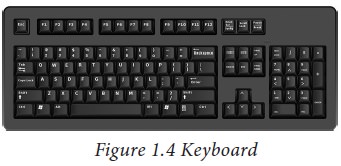
(2)
Mouse: Mouse
(wired/wireless) is a pointing
device used to control the movement of the cursor on the display screen. It can
be used to select icons, menus, command buttons or activate something on a
computer. Some mouse actions are move, click, double click, right click, drag
and drop.
Different types of mouse available
are: Mechanical Mouse, Optical, Laser Mouse, Air Mouse, 3D Mouse, Tactile
Mouse, Ergonomic Mouse and Gaming Mouse.
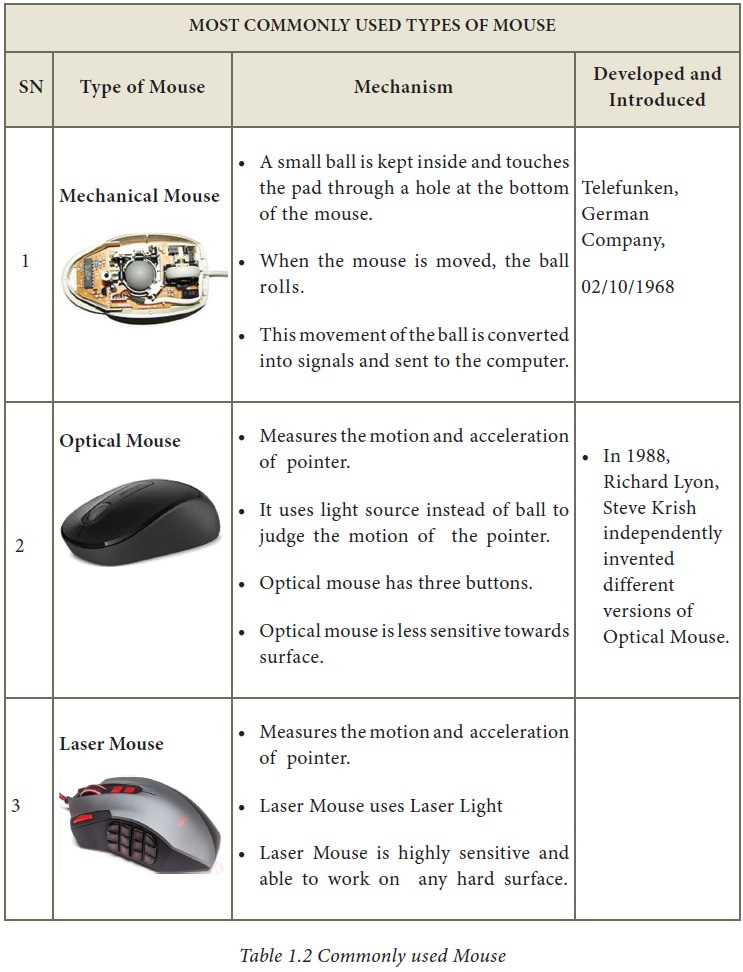
Who invented Mouse?
The computer mouse as we know it today was invented and
developed by Douglas Engelbart, with the assistance of Bill English, during the
1960's and was patented on November 17, 1970.
(3)
Scanner: Scanners are used to enter the information directly into
the computer’s memory. This device works like a Xerox machine. The scanner
converts any type of printed or written information including photographs into
a digital format, which can be manipulated by the computer.
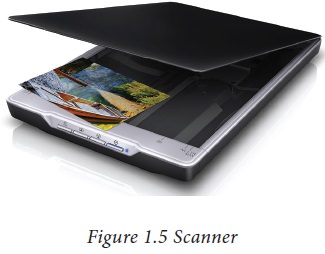
(4)
Fingerprint Scanner: Finger print Scanner is a fingerprint
recognition device used for computer security, equipped with the fingerprint
recognition feature that uses biometric technology. Fingerprint Reader /
Scanner is a very safe and convenient device for security instead of using
passwords, which is vulnerable to fraud and is hard to remember.
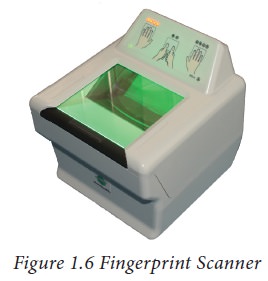
(5)
Track Ball: Track
ball is similar to the upside- down design of the mouse. The user moves the ball directly, while the device itself remains stationary.
The user spins the ball in various
directions to navigate the screen movements.
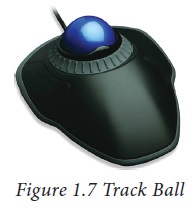
(6)
Retinal Scanner: This
performs a retinal scan which is a
biometric technique that uses unique patterns on a person's retinal blood
vessels.
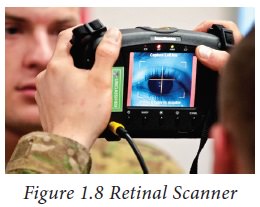
(7)
Light Pen: A
light pen is a pointing device
shaped like a pen and is connected to a monitor. The tip of the light pen
contains a light-sensitive element which detects the light from the screen
enabling the computer to identify the location of the pen on the screen. Light
pens have the advantage of ‘drawing’ directly onto the screen, but this becomes
hard to use, and is also not accurate.
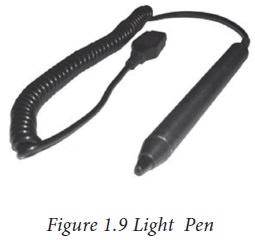
(8)
Optical Character Reader: It
is a device which detects characters printed or written on a paper with OCR, a
user can scan a page from a book. The Computer will recognize the characters in
the page as letters and punctuation marks and stores. The Scanned document can
be edited using a wordprocessor.
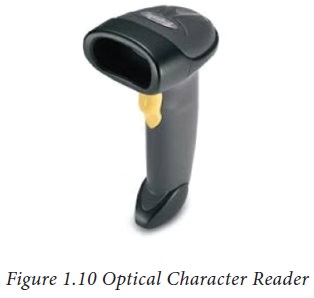
(9)
Bar Code / QR Code Reader: A
Bar code is a pattern printed in lines of different thickness. The Bar code
reader scans the information on the bar codes transmits to the Computer for
further processing. The system gives fast and error free entry of information
into the computer.
QR (Quick response) Code: The QR
code is the two dimension bar code which can be read by a camera and processed
to interpert the image.

(10)
Voice Input Systems: Microphone
serves as a voice Input device. It captures the voice data and send it to the
Computer. Using the microphone along with speech recognition software can offer
a completely new approach to input information into the Computer.
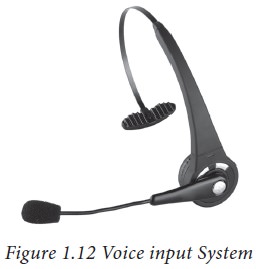
(11)
Digital Camera: It
captures images / videos directly in
the digital form. It uses a CCD (Charge Coupled Device) electronic chip. When
light falls on the chip through the lens, it converts light rays into digital
format.
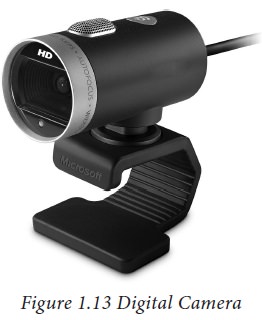
(12)
Touch Screen: A
touch screen is a display device
that allows the user to interact with a computer by using the finger. It can be
quite useful as an alternative to a mouse or keyboard for navigating a
Graphical User Interface (GUI). Touch screens are used on a wide variety of
devices such as computers, laptops, monitors, smart phones, tablets, cash
registers and information kiosks. Some touch screens use a grid of infrared
beams to sense the presence of a finger instead of utilizing touch-sensitive
input.
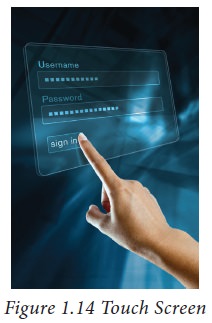
(13)
Keyer : A Keyer is a
device for signaling by hand, by way
of pressing one or more switches. Modern keyers have a large number of switches
but not as many as a full size keyboard. Typically, this number is between 4
and 50. A keyer differs from a keyboard, which has "no board", but
the keys are arranged in a cluster.
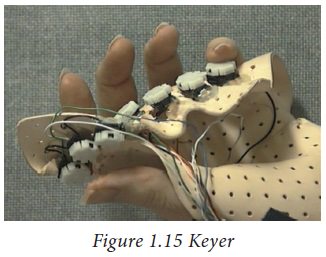
Output Devices:
(1)
Monitor: Monitor is the
most commonly used output device to
display the information. It looks like a TV. Pictures on a monitor are formed
with picture elements called PIXELS. Monitors may either be Monochrome which
display text or images in Black and White or can be color, which display
results in multiple colors. There are many types of monitors available such as
CRT (Cathode Ray Tube), LCD (Liquid Crystal Display) and LED (Light Emitting
Diodes). The monitor works with the VGA (Video Graphics Array) card. The video
graphics card helps the keyboard to communicate with the screen. It acts as an
interface between the computer and display monitor. Usually the recent
motherboards incorporate built-in video card.
The first computer monitor was
part of the Xerox Alto computer system, which was released on March 1, 1973.
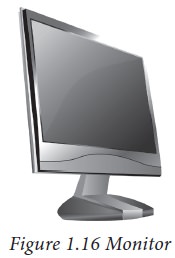
(2)
Plotter: Plotter is an
output device that is used to
produce graphical output on papers. It uses single color or multi color pens to
draw pictures.
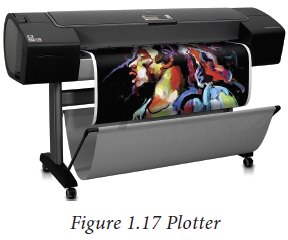
(3)
Printers: Printers are used
to print the information on papers.
Printers are divided into
two main categories:
·
Impact
Printers
·
Non
Impact printers
Impact Printers
These printers print with striking
of hammers or pins on ribbon. These printers can print on multi-part (using
carbon papers) by using mechanical pressure. For example, Dot Matrix printers
and Line matrix printers are impact printers.
A Dot matrix printer that prints
using a fixed number of pins or wires. Each dot is produced by a tiny metal
rod, also called a “wire” or “pin”, which works by the power of a tiny
electromagnet or solenoid, either directly or through a set of small levers. It
generally prints one line of text at a time. The printing speed of these
printers varies from 30 to 1550 CPS (Character Per Second).
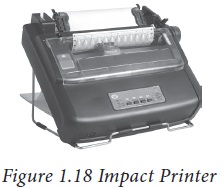
Line matrix printers use a fixed
print head for printing. Basically, it prints a page-wide line of dots. But it
builds up a line of text by printing lines of dots. Line printers are capable
of printing much more than 1000 Lines Per Minute, resulting in thousands of
pages per hour. These printers also uses mechanical pressure to print on
multi-part (using carbon papers).
Non-Impact Printers
These printers do not use striking
mechanism for printing. They use electrostatic or laser technology. Quality and
speed of these printers are better than Impact printers. For example, Laser
printers and Inkjet printers are non-impact printers.
Laser Printers
Laser printers mostly work with
similar technology used by photocopiers. It makes a laser beam scan back and
forth across a drum inside the printer, building up a pattern. It can produce
very good quality of graphic images. One of the chief characteristics of laser
printer is their resolution – how many Dots per inch(DPI). The available
resolution range around 1200 dpi. Approximately it can print 100 pages per
minute(PPM)
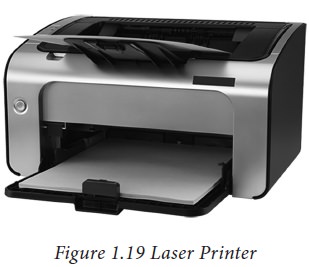
Inkjet Printers:
Inkjet Printers use colour
cartridges which combined Magenta, Yellow and Cyan inks to create color tones.
A black cartridge is also used for monochrome output. Inkjet printers work by
spraying ionised ink at a sheet of paper. The speed of Inkjet printers generaly
range from 1-20 PPM (Page Per Minute).
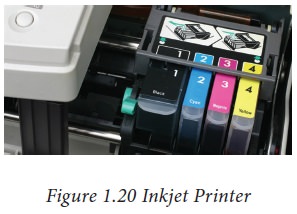
They use the technology of firing
ink by heating it so that it explodes towards the paper in bubbles or by using
piezoelectricity in which tiny electric currents controlled by electronic
circuits are used inside the printer to spread ink in jet speed. An Inkjet
printer can spread millions of dots of ink at the paper every single second.
Speakers:
Speakers produce voice output (audio) . Using speaker along
with speech synthesize software, the computer can provide voice output. This
has become very common in places like airlines, schools, banks, railway
stations, etc..
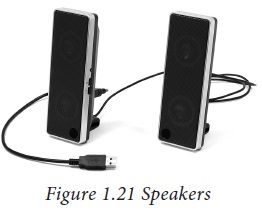
Multimedia Projectors:
Multimedia projectors are used to
produce computer output on a big screen. These are used to display
presentations in meeting halls or in classrooms.
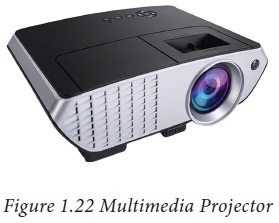
Related Topics